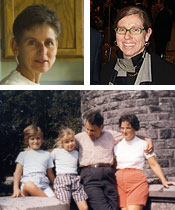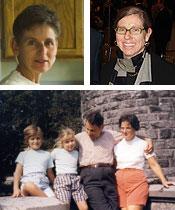
Clockwise from upper left: Ruth Eliel, Carol Eliel, the Eliel family c. 1961
A couple of years ago I heard about Ruth Eliel, who was, at the time, running the Los Angeles Chamber Orchestra. (She's now executive director of the Colburn Foundation, the largest institutional funder of classical music in L.A.) My ears perked up. I immediately thought of LACMA's modern and contemporary art curator Carol Eliel. I figured that these two very significant art leaders couldn't possibly be related. What are the odds? Pretty good, I guess. Ruth and Carol are sisters. I recently spoke with them about the changing cultural landscape in L.A., a past collaboration, and the kind of parents who raise such powerful and interesting women.
You've both been a part of L.A.'s cultural community for some time. How have things changed in town since you got started?
Carol: I came to L.A. in the fall of 1984 and it wasn't exactly a small pond then, but it's a huge pond now. The best of what was happening then continues today—there's just more of it. More shows, more museums, more artists. Yet there's still not a major arts publication based in Los Angeles.
Ruth: I came here in 1987. One of the biggest changes I've seen is that L.A. no longer has a professional dance company. Also, the number of art critics has really diminished. The Los Angeles Times doesn't have a full-time dance critic any more and is down to one full-time music critic. The L.A. Weekly no longer has a classical music critic.
So while the arts scene here has flourished by all accounts, coverage of the arts hasn't necessarily followed.
Carol: Right. When I came here in 1984, there were two papers in Los Angeles and thus two visual arts critics at dailies—Christopher Knight, formerly at the Herald-Examiner, now at the L.A. Times, and William Wilson, who was with the Times.
There's no doubt that much has changed in the newspaper world since you both came to the city. What about running an arts institution—do you think the inner workings are the same for, say, the Chamber Orchestra vs. LACMA?
Ruth: Well, music groups have one director and we all support his or her mission. An encyclopedic museum on the other hand has many curators with different visions.
Carol: Still, a performing arts organization is very much affected by that one leader, by a music director's interests, for instance. Look at the Green Umbrella series, the contemporary music series at the L.A. Phil, which has really been championed and popularized by Esa-Pekka Salonen.
You two seem to be on the same page. Have you collaborated in the past? Do you see any opportunity for collaboration in the future?
Ruth: We collaborated in 2002–2003 on a pair of conversations and performances for the now-defunct LACMA Institute for Art and Cultures, which included LACMA and the Los Angeles Chamber Orchestra. The intent of the project was to help people understand modern music (Schoenberg, for example) to the same degree they appreciate modern art (Kandinsky and others).
So you've worked together; do you play together as well?
Carol: We do. In addition to music and art, we both enjoy reading, hiking, theater, cooking, and eating. Also in common—both of our husbands are real estate lawyers. In fact, they used to work together, so Ruth met her husband through my husband (well... and through me, too!).
Your parents seem to have done something right. What kind of childhood environment creates such impressive arts professionals?
Carol: Our parents are part of the stereotypical cultured European elite. Both are German-born with broad European educations in history, literature, and music. Our father is a scientist who, along with my mother, dragged us to museums as kids whether we wanted to go or not. And we often didn't want to go!
Ruth: Our mom is from a very musical family—our great uncle was the concertmaster for the Leipzig Gewandhaus Orchestra, and his brother (our grandfather) was nearly a professional pianist. Our mother had a beautiful voice and would've taken singing lessons had she not been forced to flee Nazi Germany. Later in life she became an announcer at the classical music radio station in the town where our parents live.
Thanks to both of you for your time. We're certainly lucky to have you in Los Angeles. Just don't make us wait too long for another collaboration.



